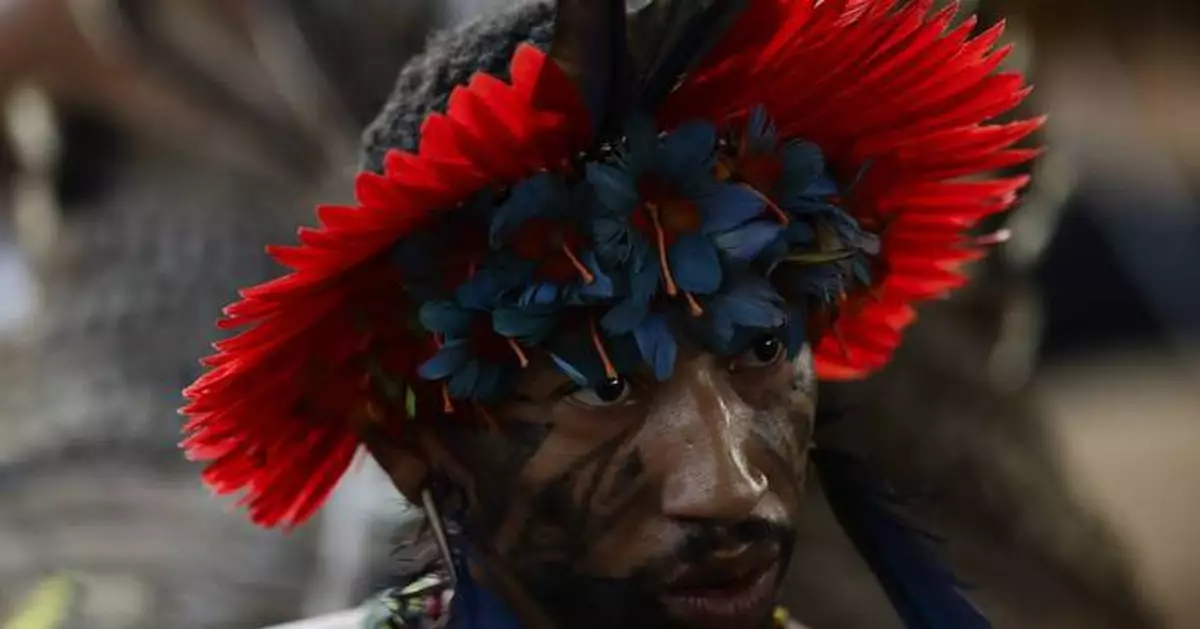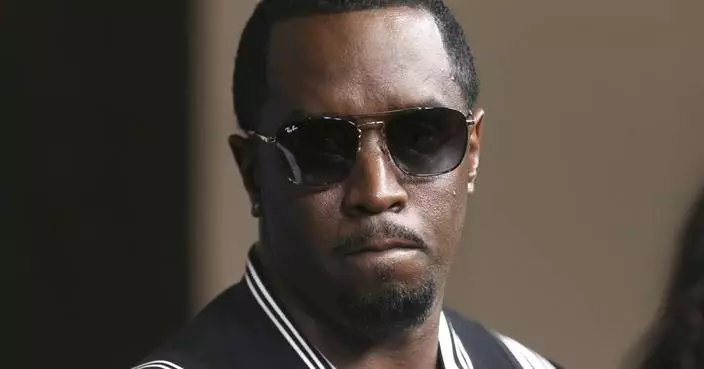RIO DE JANEIRO (AP) — Indigenous chants and the rattle of maracas resounded Thursday in a Rio de Janeiro park, where Brazil's Tupinambá people gathered to celebrate the homecoming of a sacred cloak absent for some 380 years.
Made of feathers from the scarlet ibis, the artifact from northeastern Brazil resided in Copenhagen until the Danish National Museum donated the cloak to its Brazilian counterpart.
Click to Gallery
Brazil's President Luiz Inacio Lula da Silva, second from left, Minister for Indigenous Peoples Sonia Guajajara, second from right, and Denmark's Ambassador to Brazil Eva Bisgaard Pederson, right, attend a ceremony celebrating the return of the Indigenous Tupinamba people's sacred cloak to Brazil, in Rio de Janeiro, Thursday, Sept. 12, 2024. The garment, made from bird feathers and plant fibers, was repatriated to Brazil after having spent more than 300 years in the National Museum of Denmark. (AP Photo/Bruna Prado)
RIO DE JANEIRO (AP) — Indigenous chants and the rattle of maracas resounded Thursday in a Rio de Janeiro park, where Brazil's Tupinambá people gathered to celebrate the homecoming of a sacred cloak absent for some 380 years.
Brazil's President Luiz Inacio Lula da Silva speaks during a ceremony celebrating the return of the Indigenous Tupinamba people's sacred cloak to Brazil, in Rio de Janeiro, Thursday, Sept. 12, 2024. The garment, made from bird feathers and plant fibers, was repatriated to Brazil after having spent more than 300 years in the National Museum of Denmark. (AP Photo/Bruna Prado)
Brazil's President Luiz Inacio Lula da Silva, left, speaks during a ceremony celebrating the return of the Indigenous Tupinamba people's sacred cloak to Brazil, in Rio de Janeiro, Thursday, Sept. 12, 2024. The garment, made from bird feathers and plant fibers, was repatriated to Brazil after having spent more than 300 years in the National Museum of Denmark. (AP Photo/Bruna Prado)
An Indigenous person smiles before a ceremony celebrating the return of the Indigenous Tupinamba people's sacred cloak to Brazil, in Rio de Janeiro, Thursday, Sept. 12, 2024. The garment, made from bird feathers and plant fibers, was repatriated to Brazil after having spent more than 300 years in the National Museum of Denmark. (AP Photo/Bruna Prado)
Brazil's President Luiz Inacio Lula da Silva, second from left, Minister for Indigenous Peoples Sonia Guajajara, second from right, and Denmark's Ambassador to Brazil Eva Bisgaard Pederson, right, attend a ceremony celebrating the return of the Indigenous Tupinamba people's sacred cloak to Brazil, in Rio de Janeiro, Thursday, Sept. 12, 2024. The garment, made from bird feathers and plant fibers, was repatriated to Brazil after having spent more than 300 years in the National Museum of Denmark. (AP Photo/Bruna Prado)
Indigenous people pose for a photo after a ceremony celebrating the return of the Indigenous Tupinamba people's sacred cloak to Brazil, in Rio de Janeiro, Thursday, Sept. 12, 2024. The garment, made from bird feathers and plant fibers, was repatriated to Brazil after having spent more than 300 years in the National Museum of Denmark. (AP Photo/Bruna Prado)
An Indigenous person attends a ceremony celebrating the return of the Tupinamba Indigenous people's sacred cloak to Brazil, in Rio de Janeiro, Thursday, Sept. 12, 2024. The garment, made from bird feathers and plant fibers, was repatriated to Brazil after having spent more than 300 years in the National Museum of Denmark. (AP Photo/Bruna Prado)
President Luiz Inácio Lula da Silva and Indigenous Peoples Minister Sonia Guajajara attended a ceremony at Brazil’s National Museum atop a hill in the Boa Vista Park.
“It is impossible not to appreciate the beauty and strength of this centuries-old and well-preserved piece, even after so much time outside Brazil, abroad. It is our commitment to preserve this heritage,” Lula said, addressing dozens of Indigenous people plus others of the general public.
Celebrations to welcome the cloak have been underway since last week. The Tupinambá traveled 28 hours overland from the northeastern state of Bahia to enter the museum where it hangs in carefully calibrated lighting and temperature conditions to ensure its preservation. There, they conducted rituals and prayers with the cloak they view as a living ancestor rather than an object.
Reconnecting with the cloak, which was once central to certain ceremonies, was "really wonderful,” Jamopoty Tupinambá, one of the group's leaders, said Wednesday near their encampment in the park. “The emotion was too much. The enchanted ones arrived, too,” she said, referring to spiritual ancestors.
Some at the encampment pounded drums on the parched grass amid drifting incense smoke, adorned in feathered headdresses. Anticipation and excitement due to the momentous occasion hung in the air.
The cloak stands at nearly four feet tall, and the Dutch took it from Brazil in about 1644, according to a statement from Brazil's federal government. It has been in Denmark's National Museum for 335 years, it said.
“In the process of colonization, he (the cloak) was taken away abruptly, violently, taking from the people what represented their greatest strength,” said Yakuy Tupinambá, an elder of the Indigenous group.
Centuries later, in 2000, the museum in Copenhagen lent the cloak to an exhibition in Sao Paulo. That’s when Jamopoty’s mother, Amotara Tupinambá, first saw it.
“When she arrived there, she felt great emotion. The cloak showed her, ‘I am here.’ … She was amazed,” Jamopoty recalled. The notion of petitioning for the cloak's permanent return was born.
Years later, Glicéria Tupinamba, from a village in Bahia state, traveled to Copenhagen to help identify pieces they have in their collection. The idea of securing its homecoming gathered pace.
Museums across Europe are under pressure to repatriate cultural objects. For years, the Greek have demanded the return of sculptures from the Parthenon temple on the Acropolis, which currently reside in the British Museum. French President Emmanuel Macron oversaw the much-trumpeted restitution of colonial-era treasures to Benin in 2021. Since then, France has sent little else of significance amid critics’ claims such moves would empty France’s cherished museums.
Denmark’s National Museum has received three repatriation requests in the past decade, head of research Christian Sune Pedersen told The Associated Press. They responded positively to two, including that of Brazil, deciding to donate one of its five feathered cloaks partly to help rebuild Brazil’s national museum that was ravaged by flames in a devastating 2018 fire.
Bringing it back to Brazil was a complicated operation coordinated between the foreign affairs ministry, Brazil's embassy in Denmark, the national museums of both countries and Tupinambá leaders.
Extreme care was required to avoid damaging the delicate feathers, and its sealed box was only opened once in an air-conditioned environment, said João Pacheco de Oliveira, an anthropologist and curator of the National Museum’s ethnographic collections.
It marks the first time that an Indigenous artifact of such significance has been returned to Brazil, he said.
“The expectation is that this will create new possibilities for donations or even repatriation,” he said.
Lula’s government took office in 2023, pledging to defend Indigenous groups’ land rights and established a ministry for Indigenous peoples. Such action stood in contrast to his predecessor, Jair Bolsonaro, who refused to expand Indigenous land.
However, many Indigenous people have bemoaned the slow pace of Lula’s government to expel illegal miners and land-grabbers from their territories, and to establish new ones.
In a nod to their frustration, Indigenous Peoples Minister Guajajara said Thursday she wishes the number of demarcated territories were higher.
“We really need this number to reflect the desire of the various Indigenous peoples, who — like the Tupinambá cloak, our relative, whose return we celebrate today — want to return home,” she told the crowd.
The Tupinambá are among those asking for their land to be recognized as an Indigenous reserve and given formal protection, a process known as demarcation. Brazil’s justice ministry is analyzing their request, according to a June statement from Brazil's Indigenous affairs agency, known as FUNAI.
The cloak's return is even more significant in that context, said Jamopoty Tupinambá.
“The cloak for us is the strength of the people. When he left, the people were weakened. Now he is bringing strength for the demarcation of his territory.”
AP writers Jan M. Olsen in Copenhagen, Denmark and Thomas Adamson in Paris contributed to this report.

Brazil's President Luiz Inacio Lula da Silva, right, greets Indigenous leader Yakuy Tupinamba during a ceremony celebrating the return of the Indigenous Tupinamba people's sacred cloak to Brazil, in Rio de Janeiro, Thursday, Sept. 12, 2024. The garment, made from bird feathers and plant fibers, was repatriated to Brazil after having spent more than 300 years in the National Museum of Denmark. (AP Photo/Bruna Prado)

Brazil's President Luiz Inacio Lula da Silva speaks during a ceremony celebrating the return of the Indigenous Tupinamba people's sacred cloak to Brazil, in Rio de Janeiro, Thursday, Sept. 12, 2024. The garment, made from bird feathers and plant fibers, was repatriated to Brazil after having spent more than 300 years in the National Museum of Denmark. (AP Photo/Bruna Prado)

Brazil's President Luiz Inacio Lula da Silva, left, speaks during a ceremony celebrating the return of the Indigenous Tupinamba people's sacred cloak to Brazil, in Rio de Janeiro, Thursday, Sept. 12, 2024. The garment, made from bird feathers and plant fibers, was repatriated to Brazil after having spent more than 300 years in the National Museum of Denmark. (AP Photo/Bruna Prado)
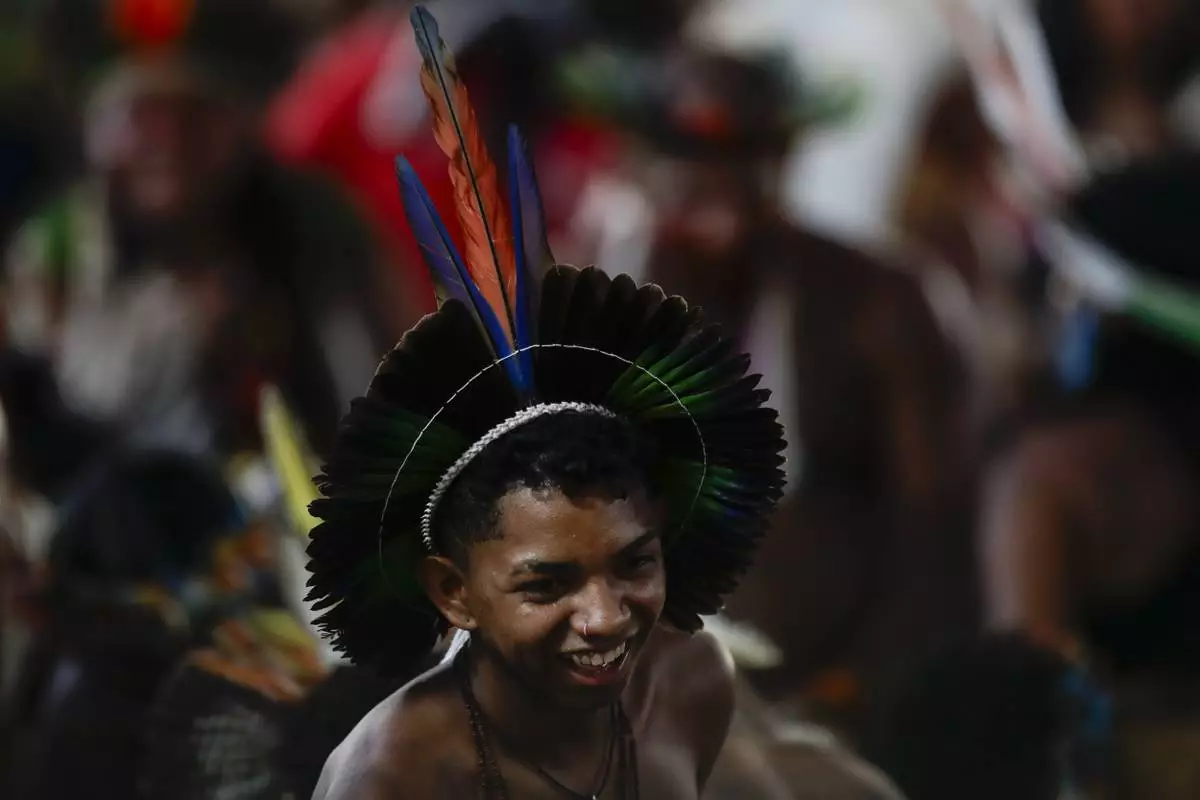
An Indigenous person smiles before a ceremony celebrating the return of the Indigenous Tupinamba people's sacred cloak to Brazil, in Rio de Janeiro, Thursday, Sept. 12, 2024. The garment, made from bird feathers and plant fibers, was repatriated to Brazil after having spent more than 300 years in the National Museum of Denmark. (AP Photo/Bruna Prado)
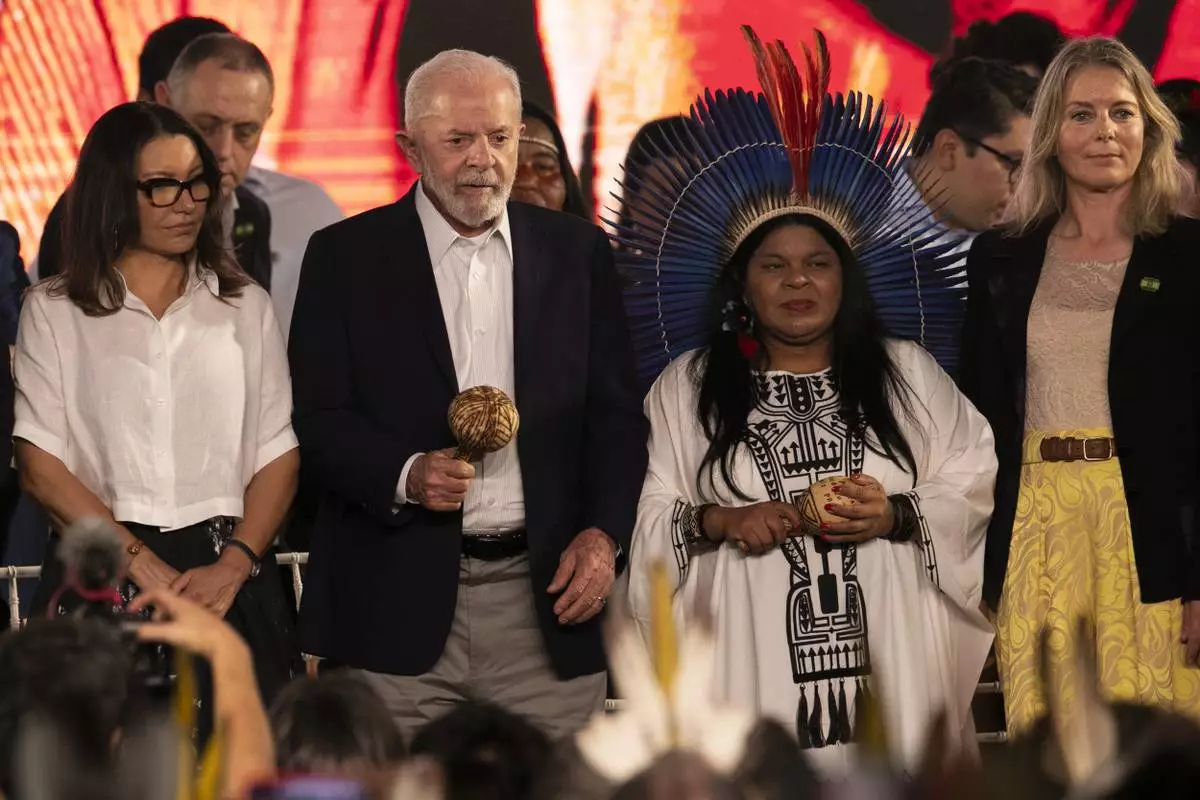
Brazil's President Luiz Inacio Lula da Silva, second from left, Minister for Indigenous Peoples Sonia Guajajara, second from right, and Denmark's Ambassador to Brazil Eva Bisgaard Pederson, right, attend a ceremony celebrating the return of the Indigenous Tupinamba people's sacred cloak to Brazil, in Rio de Janeiro, Thursday, Sept. 12, 2024. The garment, made from bird feathers and plant fibers, was repatriated to Brazil after having spent more than 300 years in the National Museum of Denmark. (AP Photo/Bruna Prado)
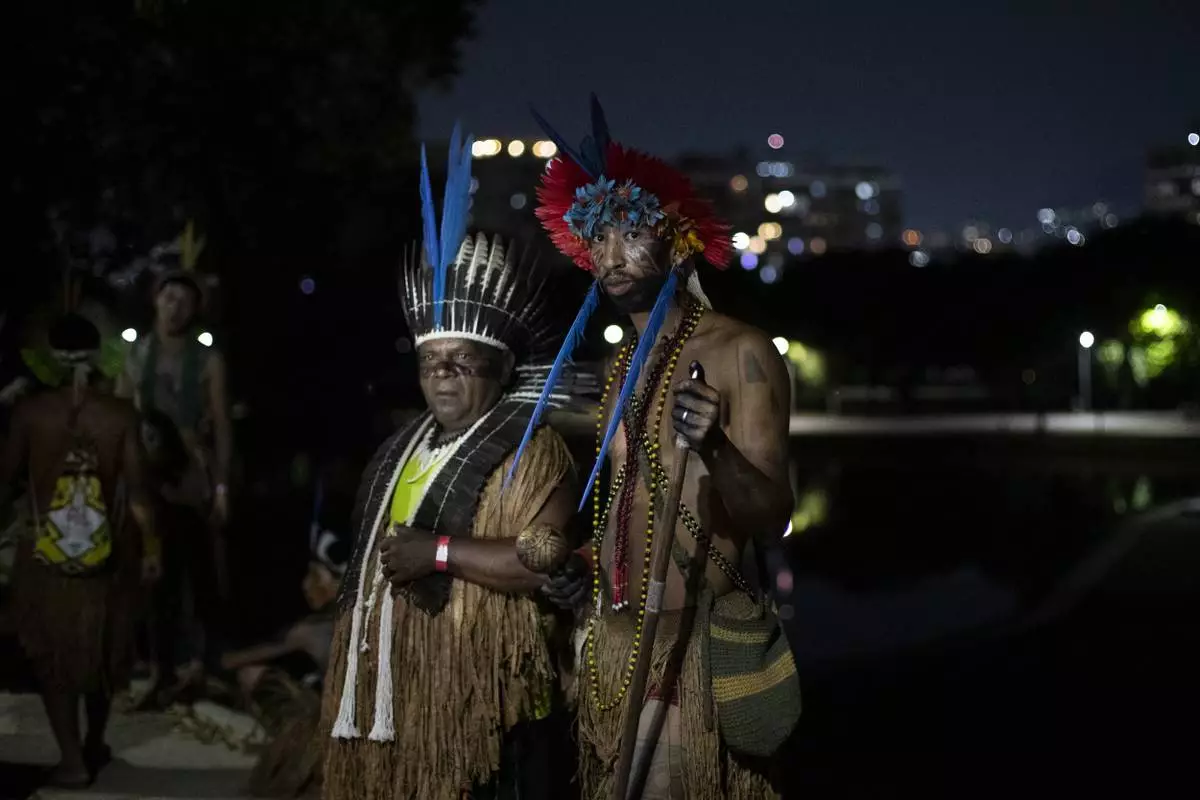
Indigenous people pose for a photo after a ceremony celebrating the return of the Indigenous Tupinamba people's sacred cloak to Brazil, in Rio de Janeiro, Thursday, Sept. 12, 2024. The garment, made from bird feathers and plant fibers, was repatriated to Brazil after having spent more than 300 years in the National Museum of Denmark. (AP Photo/Bruna Prado)
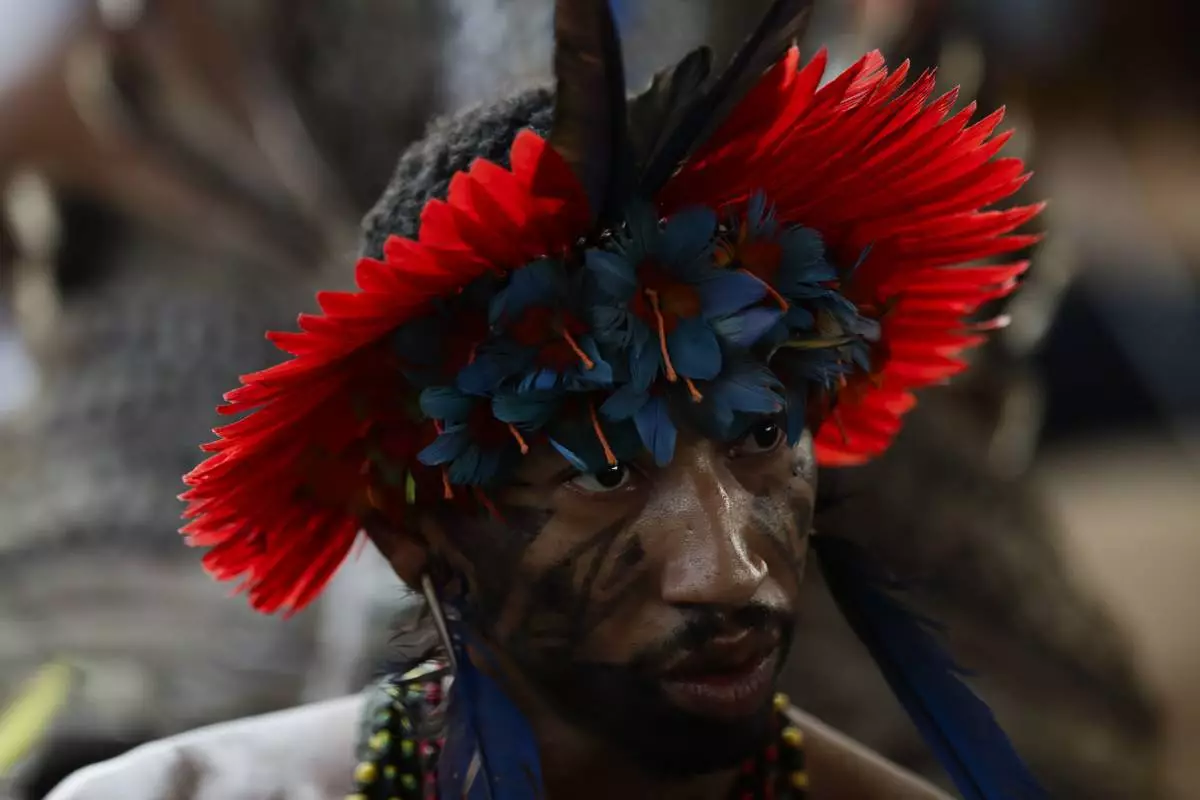
An Indigenous person attends a ceremony celebrating the return of the Tupinamba Indigenous people's sacred cloak to Brazil, in Rio de Janeiro, Thursday, Sept. 12, 2024. The garment, made from bird feathers and plant fibers, was repatriated to Brazil after having spent more than 300 years in the National Museum of Denmark. (AP Photo/Bruna Prado)
NEW YORK (AP) — Sean “Diddy” Combs pleaded not guilty Tuesday to federal sex trafficking and racketeering charges. An indictment says the music mogul “engaged in a persistent and pervasive pattern of abuse toward women and other individuals.”
Combs was arrested late Monday in Manhattan, roughly six months after federal authorities conducting a sex trafficking investigation raided his luxurious homes in Los Angeles and Miami.
Over the past year, Combs has been sued by people who say he subjected them to physical or sexual abuse. He has denied many of those allegations, and his lawyer, Marc Agnifilo, said outside the courthouse Tuesday morning that Combs, 54, would plead not guilty and that he would “fight like hell” to get his client released from custody.
Here is the Latest:
Sean “Diddy” Combs has pleaded not guilty to federal sex trafficking and racketeering charges.
Combs stood up to enter his plea in a New York courtroom Tuesday. His hands were not cuffed but he held them behind his back.
An indictment unsealed Tuesday alleges Combs presided over a sordid empire of sexual crimes, coercing and abusing women for years while using blackmail and shocking acts of violence to keep his victims in line.
A motion for bail from Combs’ attorneys proposes he be released on a $50 million bond secured by his home in Miami.
The motion filed Tuesday also proposes his detention at home with GPS monitoring, with his travel restricted to federal districts in south Florida and southern New York.
The motion says Combs will turn over his passport and that he is attempting to sell his private jet. It says he has remained in the country even though there were no restrictions on his travel, and that his attorneys have kept authorities updated on his location.
It adds that “conditions at Metropolitan Detention Center in Brooklyn are not fit for pre-trial detention.”
Prosecutors say Combs repeatedly engaged in violence towards his employees and others.
In a court filing Tuesday, prosecutors say Combs and an unidentified co-conspirator kidnapped someone at gunpoint a few days before Christmas in 2011 in order to facilitate a break-in at another person’s home. They say multiple witnesses, police reports and other records corroborate the incident.
The detention memo also says that two weeks later, Combs' allies set fire to a vehicle by slicing open its convertible top and dropping a Molotov cocktail inside.
Prosecutors say police and fire department reports document the arson and that multiple witnesses heard Combs brag about his involvement.
Prosecutors say Combs should be denied bail because he is a serious flight risk.
In a detention memo filed in court, prosecutors say Combs has “seemingly limitless resources” to flee, pointing out that his net worth is close to $1 billion, including over $1 million in personal cash on hand as of last December.
They said he has had a personal plane for international travel since 2019, along with multiple vehicles in multiple locations.
The letter says Combs “has the money, manpower, and tools” to flee without detection.
Prosecutors say the violence Combs exacted on his victims was so extreme that he should be denied bail.
In a detention letter written for the federal judge overseeing the music mogul's case, prosecutors described how Combs would assault women, employees and others “by throwing objects at them, choking them, pushing them, kicking them, and slamming them against walls and on to the ground.”
The letter says the violence was sometimes spontaneous and sometimes premeditated, including “resorting to kidnapping and arson when the defendant’s power and control were threatened.”
Prosecutors say Combs’ “disposition to violence cannot be reasonably prevented through bail conditions.”
The letter also says Combs should be denied bail because he has already reached out to potential witnesses in the case and that further attempts at witness tampering are likely.
U.S. Attorney Damian Williams says Combs did not act alone.
During a news conference Tuesday, Williams said Combs’ security and household staff, as well as operators high up in the music industry were complicit. Williams says they cleaned up damaged hotel rooms and "delivered large quantities of cash to Combs to pay for the commercial sex workers.”
Williams says the investigation is ongoing, and is urging "anyone with information about this case to come forward and to do it quickly.”
U.S. Attorney Damian Williams, whose office is bringing the case against Sean “Diddy” Combs, says the music mogul led a criminal organization that carried out kidnapping, forced labor and sex trafficking, among other crimes.
Speaking at a news conference Tuesday, Williams said authorities will seek to have Combs detained while he awaits trial.
He spoke before a display board showing images of some of the items recovered in searches of Combs’ homes in Los Angeles and Miami in March, including AR-15s and a drum magazine containing dozens of rounds of ammunition. He says agents also seized electronic devices that contain images and videos of sexual encounters.
Williams says: “Combs led and participated in a racketeering conspiracy that used the business empire he controlled to carry out criminal activity, including sex trafficking, forced labor, kidnapping, arson, bribery, and the obstruction of justice.”
Combs' lawyer, Marc Agnifilo, has said he will fight to keep his client free. He says Combs is innocent and will plead not guilty.
Comb’s former longtime girlfriend, whom he was seen attacking in a March 2016 security video, has declined to comment on the federal case against him.
Douglas Wigdor, an attorney for the singer Cassie Ventura, said in a statement released before Combs was due to appear in court Tuesday that neither he nor his client have anything to say on the matter.
Wigdor says: “We appreciate your understanding and if that changes, we will certainly let you know.”
Ventura reached a settlement with Combs last November, one day after filing a lawsuit containing allegations of beatings and abuse by the music producer.
Outside the Manhattan courthouse early Tuesday, Combs’ lawyer, noted that his client came to New York City voluntarily because they knew the charges were coming.
Marc Agnifilo said: “Not a lot of defendants do that. He came to New York to, to basically engage the court system and start the case.”
Though the indictment was not unsealed at the time of his comments, Agnifilo said they know what the charges will be and that Combs is “innocent of these charges.” He vowed to “fight like hell” to get Combs released from federal custody.
The indictment alleges Combs hit, kicked and threw objects at victims, and sometimes dragged them by their hair, causing injuries that often took days or weeks to heal. It says Combs also threw people around, choked and shoved them.
Prosecutors say his employees and associates witnessed his violence and, rather than intervening, helped him cover it up, including by preventing victims from leaving, and locating and contacting victims who attempted to flee.
The indictment describes Combs as the head of a criminal enterprise that engaged or attempted to engage in activities including sex trafficking, forced labor, interstate transportation for purposes of prostitution, drug offenses, kidnapping, arson, bribery and obstruction of justice.
He’s accused of striking, punching and dragging women on numerous occasions, throwing objects and kicking them, and enlisting his personal assistants, security and household staff to help him hide it all.
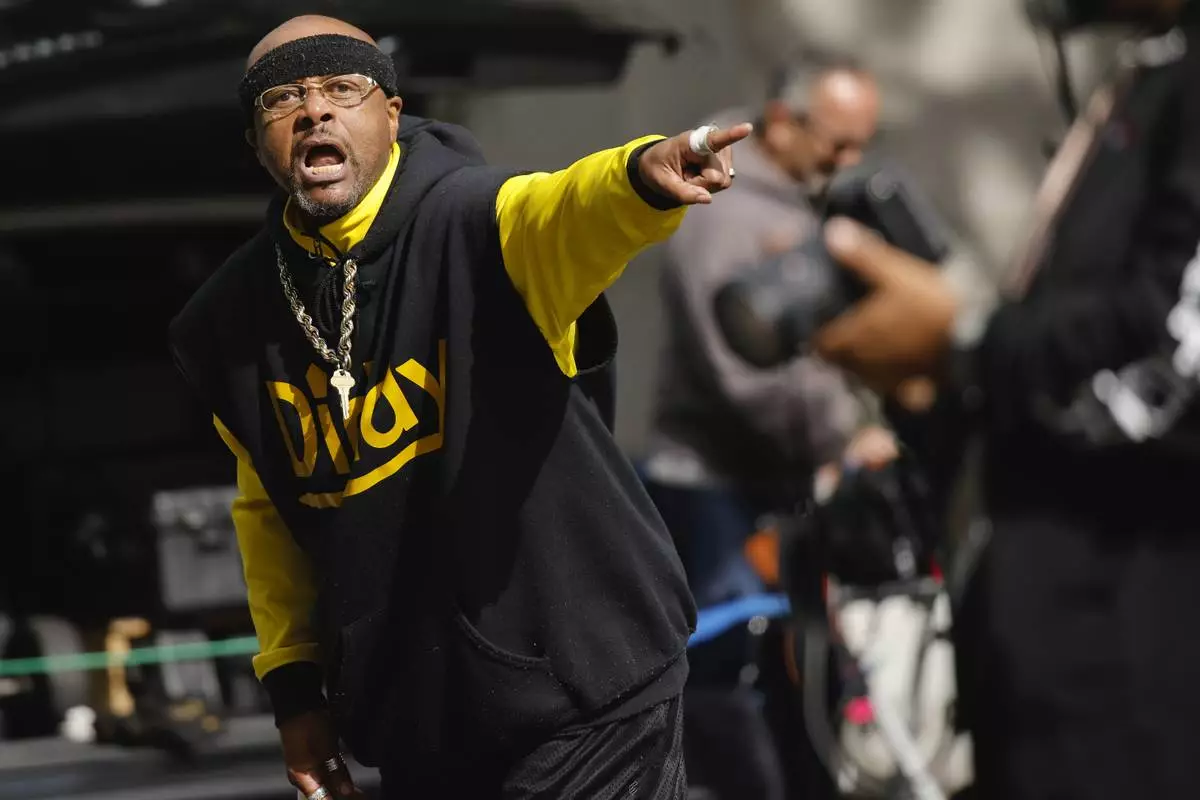
Lawrence Stark, of the Bronx borough of New York, makes comments in support of Sean "Diddy" Combs, outside Manhattan federal court, Tuesday, Sept. 17, 2024, in New York. (AP Photo/Eduardo Munoz Alvarez)









